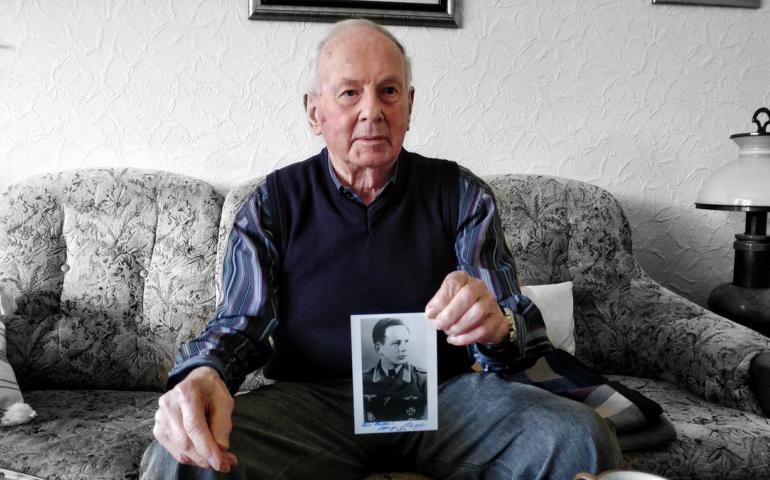
Hugo Broch (born January 6, 1922 in Leichlingen) is a former German officer and fighter pilot, most recently a lieutenant in the German Air Force during World War II. The flying ace earned 81 confirmed aerial victories in 324 enemy flights on the Eastern Front, including twelve double and three triple victories.
Luftwaffe:
Hugo Broch joined Luftwaffe Construction Company 42/XII of Luftflotte 3 on January 15, 1940, and subsequently received basic training in the Fluganwärter Battalion. From Nov. 10, 1940, to Oct. 29, 1941, he attended the A/B 63 Aircraft Pilot School at Marienbad and Karlsbad in the Sudetengau and at Vilseck in the Upper Palatinate, then from Nov. 18, 1941, to Feb. 10, 1942, he attended the Fighter Pilot Pre-School at Kamenz in Saxony, where he earned the Aircraft Pilot Badge on Nov. 28, 1941. Broch was trained as a fighter pilot from May 27 to November 2, 1942, at Fighter Pilot School 2 in Zerbst.
After training for three weeks in Bussac, France, in the 1st Squadron of the Supplementary Fighter Group East, Hugo Broch was assigned to the 6th Squadron of the II Group of Fighter Squadron 54 on January 6, 1943, and gained his first experience at the front as a Kaczmarek under Rottenführers Horst Ademeit and Heinrich "Bazi" Sterr. On March 7, he reported his first kill, which, however, was not confirmed; his first recognized aerial victory occurred on March 13, 1943. He received the Frontflugspange der Tagjäger in Bronze on March 26, 1943, and the Iron Cross II Class on April 7, 1943. From Orel, Broch took part in Unternehmen Zitadelle from May 1943 as part of the 1st Flieger-Division of Luftflotte 6. There, on June 10, 1943, he received the Frontflugspange der Tagjäger in Silber.
As a result of the counteroffensive at Orel, the 6th Squadron's Fliegerhorst had to be transferred to the Reichskommissariat Ukraine in Kiev, where he was awarded the Iron Cross, I Class, on August 11, and the Frontflugspange der Tagjäger in Gold for 110 enemy flights on August 23, 1943. Broch finally achieved his 20th aerial victory on August 28, 1943. In October, the squadron was ordered to Zhytomyr as a result of the Battle of the Dnieper. After his 44th aerial victory, he received the Honorary Trophy for Special Achievement in Aerial Warfare on November 6, 1943. Three weeks later, on November 26, the sergeant was awarded the German Cross in Gold.
From December 9, 1943, to February 2, 1944, Hugo Broch was stationed in Biarritz, southern France, and from March 4 to June 29, 1944, in Liegnitz, Lower Silesia, as a flight instructor with the Ergänzungs-Jagdgruppe Ost, but returned to his 6th Squadron in Livonia at Wenden on August 16, 1944. After being stationed briefly at Riga on September 22 and at Libau in Courland from October, Broch was transferred to the 8th Squadron of II Group in November 1944, also at Libau, from where he also flew mostly over Courland. By the end of 1944, he recorded a total of 71 victories. Stationed in C?rava for three months, the sergeant received the Knight's Cross of the Iron Cross from General der Flieger, Curt Pflugbeil, on March 12, 1945, after 79 aerial victories. In March 1945, he and his squadron moved to Heiligenbeil in East Prussia.
Hugo Broch was last awarded the Kurland sleeve ribbon on April 20, 1945. Among his total of 81 aerial victories were 18 kills of Soviet Shturmoviks. On May 8, 1945, the lieutenant flew to Flensburg, where he became a British prisoner of war for 80 days.
Postwar period:
After release from captivity, Hugo Broch gained a foothold in civilian life and was employed by Agfa AG in Leverkusen until his retirement.
Hugo Broch was a very active signer of autographs and memorabilia for many years. In the summer of 2017, at the age of 95, he became the first former Luftwaffe pilot to fly in a Spitfire, which was reported by the BBC as well as major British newspapers such as the Daily Mirror, The Daily Telegraph and Daily Mail.
Hugo Broch completed his 100th year on January 6, 2022.